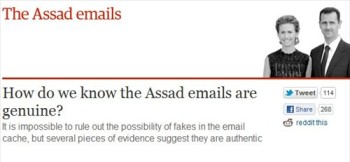
(Credit: Guardian, screenshot)
The Guardian explained in a March 14 post how it verified the “cache of 3,000 emails” from Syria’s leader Bashar al Assad.
As the Guardian explained, the e-mails are “between Syrian president Bashar al- Assad and his wife Asma and their inner circle of family and confidants, as the country slides toward civil war.”
While the Guardian noted, “It is impossible to rule out the possibility of fakes in the email cache,” the newspaper explained that the e-mails include “a wealth of private information — including family photographs and videos, a scan of the president’s identity card and a birth certificate” and personal e-mails that likely couldn’t all have been faked. Notably, the Guardian was one of the news outlets that WikiLeaks provided advance looks of its leaks in 2010.
Further, the Guardian explained that it asked “10 people whose emails appear in the cache” about the e-mails and they either “confirmed…or refused to deny they are genuine.”
The Guardian added that “In other cases the Guardian has checked facts set out in the cache.” For example, the Guardian verified an e-mailed “demand” for a newspaper apology with the actual published apology in a newspaper.
The Guardian allowed for the possibility that there could be “fake emails in the cache,” nothing that “it would be impossible to contact everyone” in the cache. “However, none of the checks we have conducted has contradicted activists’ claims about the emails,” the Guardian wrote.
The Guardian also explained why it felt it “is justified in publishing private correspondence.” According to the Guardian, the newspaper’s reporters withheld “personal information, including photographs” and it “did not solicit the material” as a whole. Further, the Guardian explained that it found some of the material to be “of clear public interest.”
According to CNN’s website, CNN’s Anderson Cooper also was leaked a copy of the e-mails, which Cooper noted were hacked.
The Assads’ e-mails were hacked and “obtained by Syrian activists,” Yahoo News and CNN explained. The Atlantic Wire added that Assad’s e-mails were also hacked by online group Anonymous.
Hat Tip: Editors Weblog




